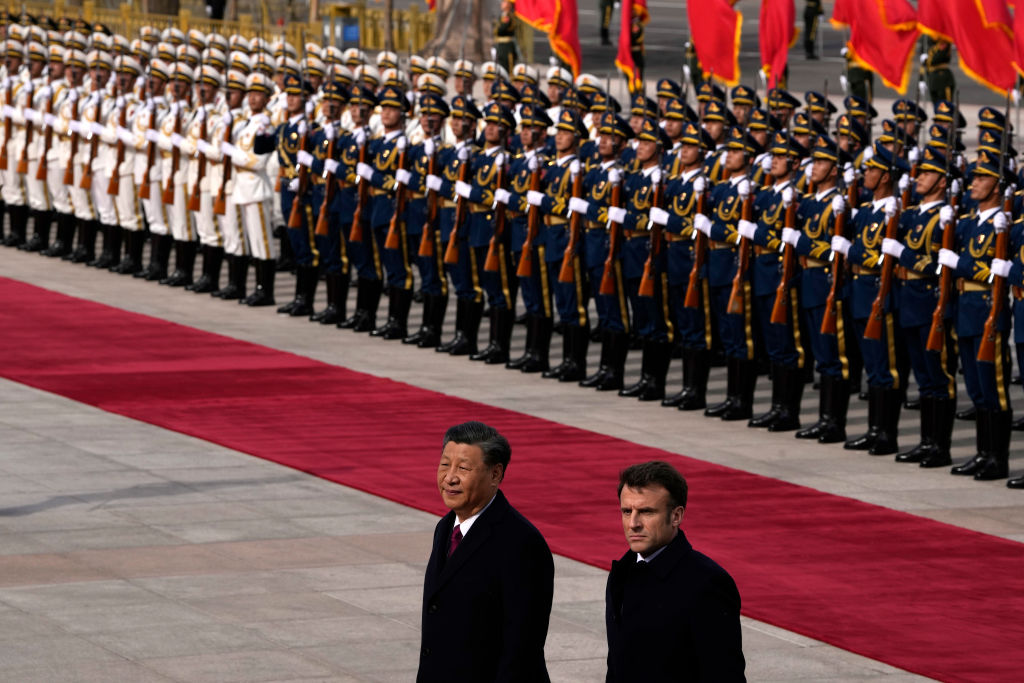At least there was no six metre-long table in Beijing separating Emmanuel Macron from Xi Jinping. But their meeting was about as fruitless as the French president’s socially distanced chat with Xi’s ‘best friend’ Vladimir Putin in Moscow last year, shortly before the Russian leader sent his tanks into Ukraine.
Macron’s visit to China was a performance, aimed to bolster his credentials as an international statesman at a time of troubles at home
There was something very retro about the Macron’s visit to China. It led to a scene almost from centuries ago when foreign plenipotentiaries would trail to the Middle Kingdom bearing gifts and seeking favours from the emperor. It was also a throwback to the more recent times when it was still possible to talk about reform in China while keeping a straight face.
Xi’s China is now a dark and repressive place. His growing international aggression, economic coercion and support for Putin have provoked dismay from much of the western world, forcing them to reassess relations with Beijing. Though on the evidence of his three days in China, this seems to have largely passed Macron by.
The French president said he wanted to ‘relaunch a strategic and global partnership with China’ and spoke about ‘shared responsibility for peace and international stability’. He rejected a policy of economic decoupling from China, overlooking the fact that this is a long standing policy of Beijing, and not something cooked up in Washington. ‘I do not believe, and do not want to believe in this scenario,’ he said.
Macron was trailed by a 50-strong entourage of business leaders, film makers and musicians. Among the gifts he brought for his Chinese counterpart were a French photographer’s pictures of mid-20th-century China and a blue Sèvres porcelain vase decorated with golden fish.
The main reason for the visit was supposedly to urge Xi to put pressure on Russia to end the war in Ukraine. ‘I know I can count on you to bring Russia to its senses and bring everyone to the negotiating table,’ he said to the Chinese president during what was billed as a joint press conference (a not very accurate billing since no questions were allowed).
Xi, who has failed to condemn Russia’s aggression and has echoed Putin’s justifications, voiced familiar platitudes. ‘China is willing to jointly appeal with France to the international community to remain rational and calm,’ was about the best he could do in carefully scripted remarks. Macron, ad-libbing at times, spoke twice as long as his host, which was seen as a breach of protocol. Xi looked impatient, heaving several deep sighs, and the end of the press conference couldn’t come early enough for him.
That said, Xi enjoys being courted as a potential peacemaker, even if that is totally preposterous. Xi’s priority is Xi, and the Ukraine war suits him just fine right now. It ties up his western adversaries, drawing their attention away from the Indo-Pacific, and provides big economic benefits in terms of cheap hydrocarbons from Russia. It also solidifies China’s role as the senior partner with Putin. Xi is effectively bankrolling Putin’s aggression through massively increased trade, which includes dual-use items (which can be used for both civilian and military purposes) such as chips and consumer drones. While he has avoided crossing western red lines by overtly supplying arms and ammunition, he has gone right up against it.
Beijing’s so-called peace place is no such thing. It is a collection of empty and contradictory platitudes and the ceasefire it advocates would reward Russian aggression. Xi and Putin are too similar, sharing a world view based on building a new order safe for autocrats and restoring mythical notions of imperial greatness, underpinned by grievance and victimhood. Perhaps the closest Xi has come to expressing his true feelings were in unguarded remarks in Moscow, as he bid farewell to Putin after their summit last month. ‘Change is coming that hasn’t happened in 100 years and we are driving this change together,’ he said.
Xi’s immediate goal is to try and draw Europe away from America, and he sees Macron as a useful tool for that purpose. ‘China still sees Europe as an independent pole in a multipolar world, and supports its efforts to achieve strategic autonomy,’ he said at their press conference.
Quite what European Commission President Ursula von der Leyen made of Macron’s performance is harder to tell. She was also in Beijing, having accepted a last minute invitation from Macron to join him. She met Xi both with the French president and without him, but her reception was far cooler. She had a limited itinerary and no invitation to the banquet for Macron. She has taken an increasingly hard line, recently urging Europe to ‘de-risk’ from its over dependency on China, for which Chinese state media have attacked her for being an ‘American puppet’.
She said that Beijing ‘has a big responsibility to use its influence in a friendship that is built on decades with Russia’ and warned against supplying weapons. And she added that Xi had reiterated his willingness to talk to Ukrainian president Zelensky ‘when the time is right’. Unfortunately the time never seems to be right. They have not spoken since the war began, in spite of Zelensky’s desire to do so, and the total absurdity of Xi posing as a mediator while avoiding talking to the victim in the conflict seems lost on credulous European leaders.
Of course Macron’s visit to China was also a performance, aimed to bolster his credentials as an international statesman at a time of troubles at home. One anonymous Elysée adviser somewhat gave the game away in a briefing just before the visit, boasting, ‘You can count with one hand the number of world leaders who could have an in-depth discussion with Xi.’ It is a ridiculous performance in a way, but also a dangerous one, since paying lip-service to Xi’s absurd pretences as a mediator can only boost the standing of the Chinese leader.
Among those accompanying Macron was the musician Jean-Michel Jarre, who boasts of being the first westerner to perform in the People’s Republic of China, when he gave a concert in 1981. Jarre has just completed an epic project called Oxymore, a play on Oxymoron, a figure of speech where opposing or contradictory terms are combined. A bit of a dog’s dinner might be a less charitable way of describing it. There could not be a more appropriate theme tune to Macron’s three days of posturing in China.







Comments